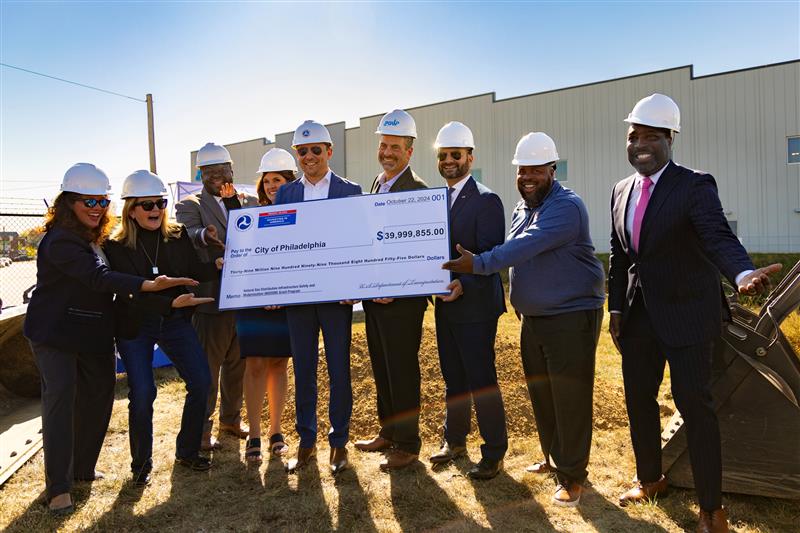
Funding from the Bipartisan Infrastructure Law aids in accelerating PGW’s Main Replacement Program to significantly reduce methane emissions, improve safety, lower costs, and enhance service reliability.
(PHILADELPHIA- OCTOBER 22, 2024) Today, Philadelphia Gas Works (PGW) announced it has been provisionally awarded a $40 million Natural Gas Distribution Infrastructure Safety and Modernization (NGDISM) grant from the U.S. Department of Transportation’s (DOT) Pipeline and Hazardous Materials Safety Administration (PHMSA), established by President Biden’s historic Bipartisan Infrastructure Law.

[L to R: PFMC Board Member Natalia Dominguez Buckley, Congresswoman Madeleine Dean (D-PA), City Councilmember Anthony Phillips, City Controller Christy Brady, PHMSA Deputy Administrator Tristan Brown, PGW President & CEO Seth Shapiro, White House National Climate Advisor Ali Zaidi, Philadelphia Building and Construction Trades Business Manager Ryan Boyer, City Council President Kenyatta Johnson.]
This grant, combined with two other awards from PHMSA since 2022, will fund a $125M infrastructure plan in historically disadvantaged Philadelphia neighborhoods. The project will result in the replacement of 66 miles of cast iron main, the creation of 120 new skilled jobs and reduce 412 metric tons of methane emissions.
“For the first time, thanks to the Bipartisan Infrastructure Law, we are empowering communities to expedite these critical safety improvements while helping families save money on their energy bills,” said PHMSA Deputy Administrator Tristan Brown, who announced the grant for PGW this morning at PGW’s North Operations Center.. “On average, businesses, families, and everyday Americans can expect to save hundreds of dollars on their energy bills thanks to these necessary safety improvements funded through this new grant.”
The funding will be used toward PGW’s Main Replacement Program, which directly supports the delivery of safe, reliable energy and advances PGW’s methane reduction program efforts. Replacing aging cast iron pipes with upgraded material that does not rust or corrode and that eliminates methane escape will help PGW meet its 2050 goal of reducing methane emissions by 80 percent. PGW expects to complete its cast iron replacement project by 2058.
“We are extremely grateful to PHMSA for its commitment to improving natural gas safety and service for Philadelphia residents,” said Seth Shapiro, PGW President and Chief Executive Officer. “This PHMSA grant will further support our installation of new natural gas pipelines that make operations safer for our communities and our employees and contribute to the climate goals of PGW and the city,” he said. “This award also delivers real bill savings to PGW customers by reducing the financial costs related to upgrading existing pipelines and performing ongoing maintenance costs of aging infrastructure.”
The PHMSA NGDISM grant program helps improve public safety, protect public health, and reduce methane emissions from natural gas distribution pipes. The grant provides nearly $1 billion in funding over five years to modernize municipal and community-owned natural gas distribution systems, like PGW, helping to keep communities across the country safe from pipeline leaks.
You can find more information on the NGDISM grant program here and to learn more about PGW’s pipeline improvements, visit pgworks.com/pipeline-map.
PGW ambitiously challenges the norms of energy production and delivery in Philadelphia as an influential force in the city’s clean energy future. Accelerating its main replacement program is one among many initiatives PGW is pursuing to build a cleaner and greener Philadelphia for generations to come. Recently, PGW:
These and future programs are designed to support PGW’s long-standing and evolving commitment to sustainability. PGW is focused on upgrading its infrastructure, installing new, emission-reducing equipment, helping customers reduce energy usage, and seeking new opportunities for energy innovation and greenhouse gas emission reductions.
PHILADELPHIA (July 2, 2024) – Philadelphia Gas Works’ (PGW) offices and the Customer Call Center will be closed in observance of Independence Day on Thursday, July 4, 2024. PGW’s 24-hour Emergency Hotline will only remain open for odor calls and gas-related emergencies.
PGW offices and Customer Call Center will resume regular business hours on Friday, July 5, 2024.
Customers who need to access account information or pay their bill online can log into their PGW My Account, pay by phone at 215-235-1000, or make cash payments in person at hundreds of local retailers, including Walmart, CVS, Dollar General, Family Dollar, 7-Eleven, Speedway, Rite Aid, and Walgreens. For information, visit pgworks.com/customer-care/your-home/ways-to-pay.
Additionally, customers can now manage their My Account from the PGW mobile app. The one-stop app is a convenient way to manage your account, monitor usage, make payments, and more! Customers can download the app for free on the Apple store or on Google Play. For information, visit pgworks.com/customer-care/your-home/ways-to-pay.
For a comprehensive list of family-friendly events and happenings to ring in America’s birthday, please visit: https://www.visitphilly.com/july-4th-in-philadelphia/.
PHILADELPHIA (May 23, 2024) – Philadelphia Gas Works’ (PGW) offices and the Customer Call Center will be closed in observance of Memorial Day on Monday, May 27, 2024. PGW’s 24-hour Emergency Hotline (215) 235-1212 will only remain open for odor calls and gas-related emergencies.
PGW offices and Customer Call Center will resume regular business hours on Tuesday, May 28, 2024.
Customers who need to access account information or pay their bill online can log into their PGW My Account, pay by phone at 215-235-1000, or make cash payments in person at hundreds of local retailers, including Walmart, CVS, Dollar General, Family Dollar, 7-Eleven, Speedway, Rite Aid, and Walgreens. For information, visit pgworks.com/customer-care/your-home/ways-to-pay.
Additionally, customers can now manage their My Account from the new PGW mobile app. The one-stop app is a convenient way to manage your account, monitor usage, make payments, and more! Customers can download the app for free on the Apple store or on Google Play. For information, visit pgworks.com/customer-care/your-home/ways-to-pay.
This Memorial Day, PGW appreciates and remembers the heroic service of men and women of the Armed Forces who have fallen defending the United States of America. PGW reminds all employees and customers to stay safe this weekend while observing the holiday and engaging in outdoor activities.
Page 8 of 79 pages.